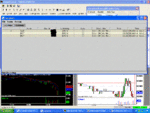"sure there are going to be those who trade irreguarilly and who have one trading style and might end up riding trends by default - and with stop losses in place will feel they have trading by the short and curlies - but once the cycle turns - they are going to start accumilating losses and then disapear into the stop loss abyss"!...
This is a bit all encompassing I think... yes, I have no doubt there will be some individuals who don't know their tolerances for risk and /or don't know how to manage numbers to negate drawdown, but there are those who do know how to do these things who fit the first half of the statement ,but don't fit the second half of that statement... and let us also distinguish between the terms "Loss" and "drawdown"...one is realised whilst the other exists only on paper and is transformed into "loss" only by those who do fit the entire statement quoted above...
This is the best thread I have read for a while,because the differing views are giving the issue a real working over.
Cheers
This is a bit all encompassing I think... yes, I have no doubt there will be some individuals who don't know their tolerances for risk and /or don't know how to manage numbers to negate drawdown, but there are those who do know how to do these things who fit the first half of the statement ,but don't fit the second half of that statement... and let us also distinguish between the terms "Loss" and "drawdown"...one is realised whilst the other exists only on paper and is transformed into "loss" only by those who do fit the entire statement quoted above...
This is the best thread I have read for a while,because the differing views are giving the issue a real working over.
Cheers

